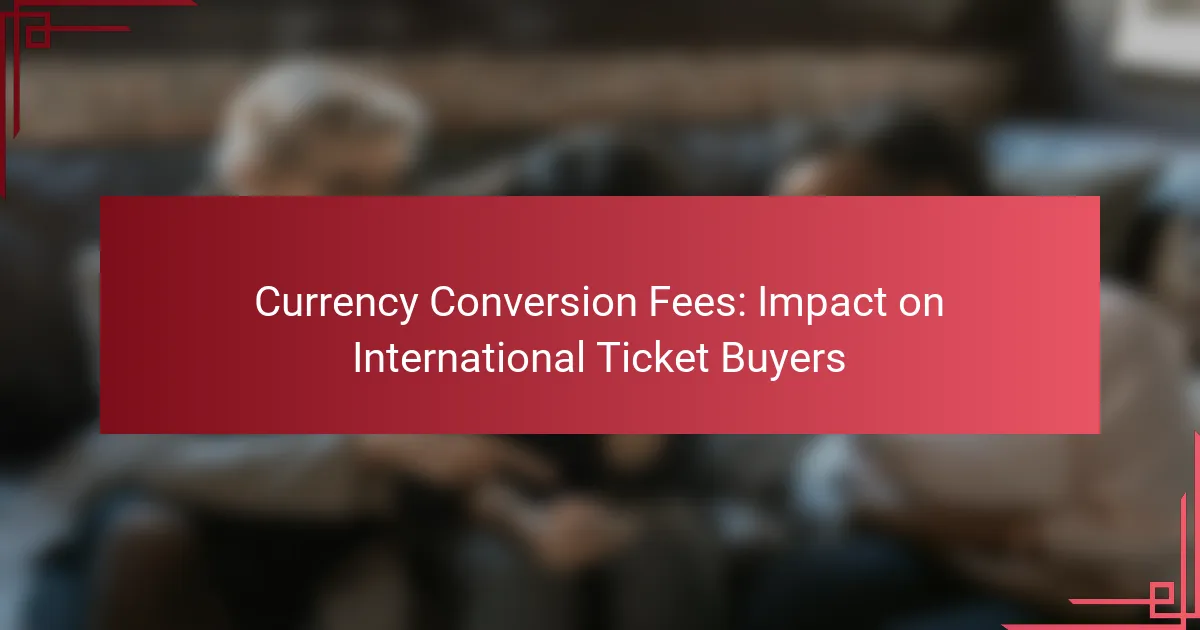When purchasing international tickets, currency conversion fees can substantially increase the overall cost. Typically ranging from 1% to 3% of the transaction amount, these fees can strain travel budgets, particularly when buying in foreign currencies. By choosing the right payment methods and utilizing travel-specific credit cards, buyers can effectively minimize these additional costs.
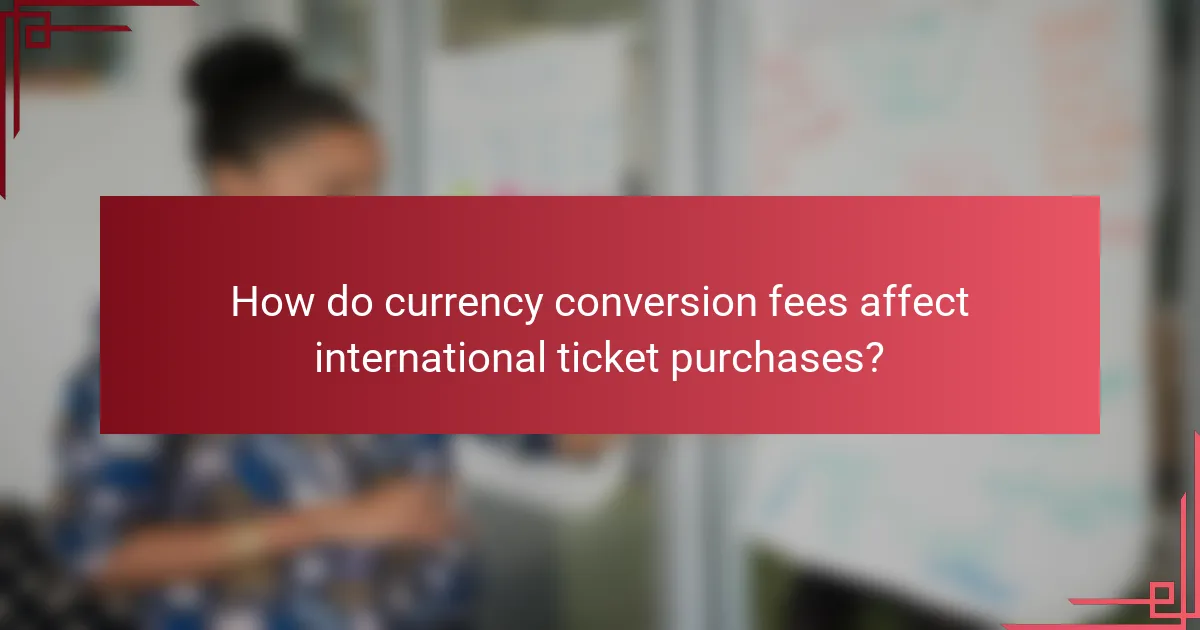
How do currency conversion fees affect international ticket purchases?
Currency conversion fees can significantly increase the cost of international ticket purchases. These fees, often charged by banks or credit card companies, can add a percentage to the total price, impacting overall travel budgets.
Increased overall ticket costs
When purchasing tickets in a foreign currency, travelers may face currency conversion fees that typically range from 1% to 3% of the transaction amount. For example, if a ticket costs €500, a 2% fee would add an additional €10 to the total cost, making the ticket more expensive than initially anticipated.
Additionally, some airlines or booking platforms may impose their own conversion fees, further inflating the ticket price. It’s essential to check the terms and conditions before finalizing a purchase to avoid unexpected charges.
Impact on budget travel
For budget travelers, currency conversion fees can erode savings that are crucial for affordable trips. A small fee on multiple transactions can accumulate, leading to significant additional costs over time. For instance, if a traveler buys several tickets or pays for services in a foreign currency, the total fees could exceed the cost of a budget accommodation.
To mitigate these costs, travelers should consider using credit cards that offer no foreign transaction fees or explore payment options that allow for local currency transactions. This approach can help maintain a tighter budget while traveling internationally.
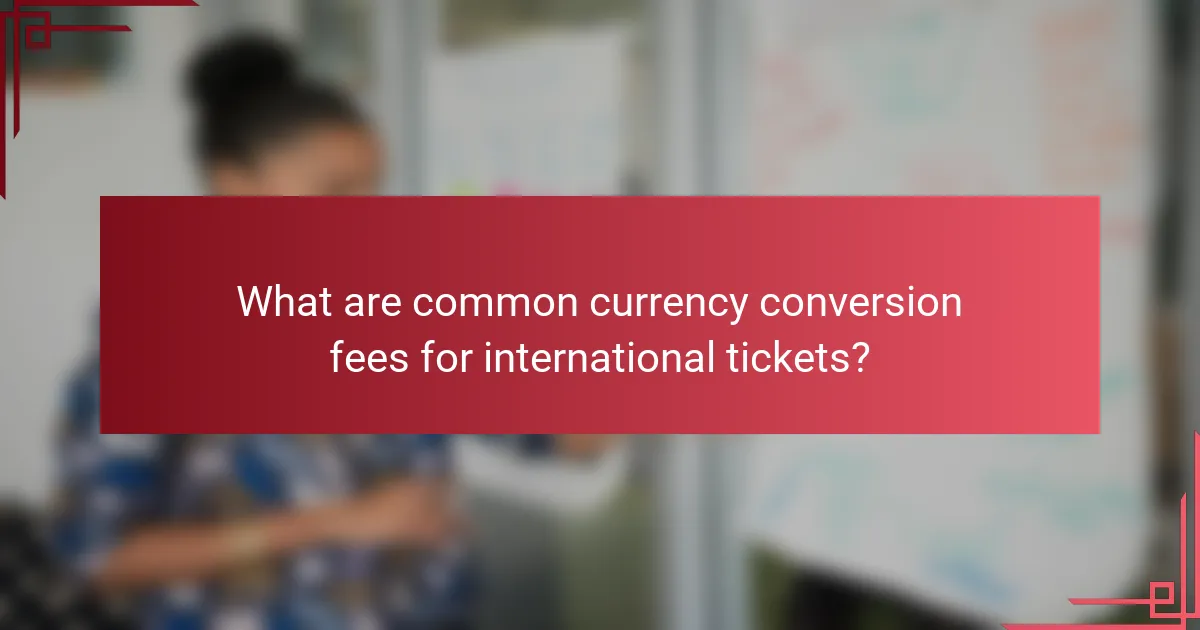
What are common currency conversion fees for international tickets?
Currency conversion fees for international tickets typically range from 1% to 3% of the transaction amount. These fees can significantly impact the overall cost of your ticket, especially when purchasing in a foreign currency.
Credit card foreign transaction fees
Credit card foreign transaction fees are charges imposed by credit card issuers when you make purchases in a currency other than your home currency. These fees usually range from 1% to 3% of the purchase amount, depending on the card issuer and the specific card terms.
To avoid these fees, consider using a credit card that does not charge foreign transaction fees. Many travel-focused credit cards offer this benefit, allowing you to save money when buying international tickets.
Dynamic currency conversion charges
Dynamic currency conversion (DCC) allows you to pay for purchases in your home currency while traveling abroad. However, this service often comes with additional charges, typically ranging from 3% to 5% above the standard exchange rate.
When offered DCC at the point of sale, it’s usually better to decline and pay in the local currency instead. This can help you avoid inflated conversion rates and additional fees, ultimately saving you money on your international ticket purchase.
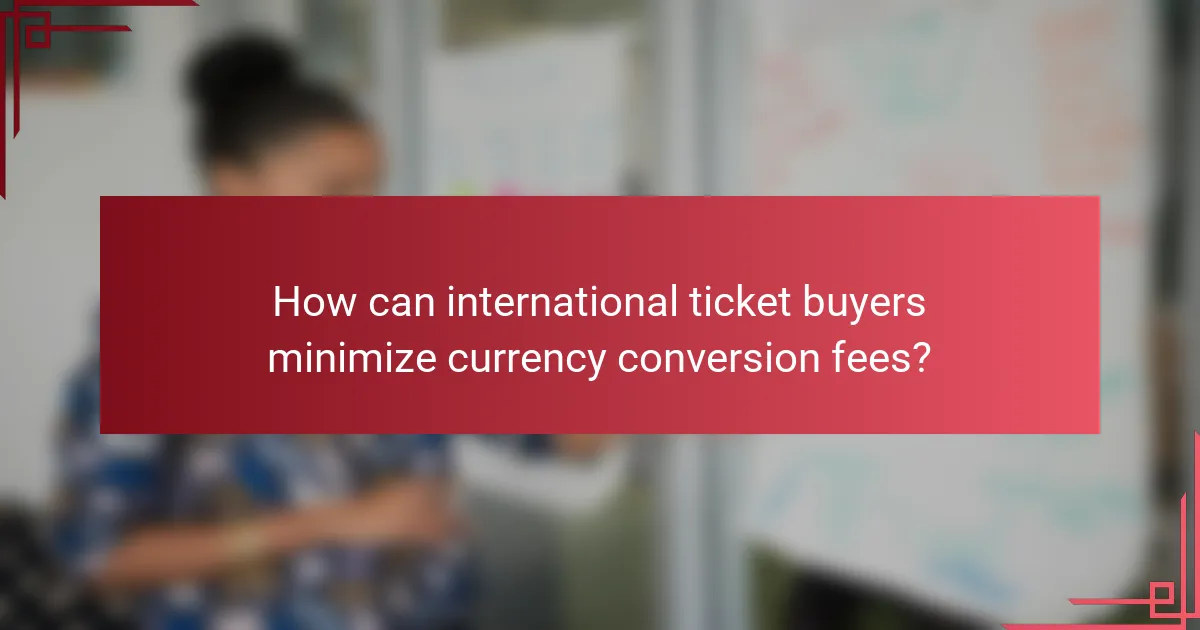
How can international ticket buyers minimize currency conversion fees?
International ticket buyers can minimize currency conversion fees by selecting the right payment methods and using travel-specific credit cards that offer favorable exchange rates and lower fees. Being strategic about how and when you pay can significantly reduce the costs associated with currency conversion.
Use travel-specific credit cards
Travel-specific credit cards often come with no foreign transaction fees and competitive exchange rates, making them ideal for international purchases. Many of these cards offer rewards or cashback on travel-related expenses, which can further offset costs.
When choosing a travel credit card, look for options that provide additional travel benefits, such as travel insurance or airport lounge access. This can enhance your overall travel experience while saving you money on currency conversion.
Choose payment methods wisely
When purchasing international tickets, consider using payment methods that minimize conversion fees. For instance, paying in the local currency of the ticket seller can sometimes result in better rates than paying in your home currency.
Additionally, be cautious with third-party payment platforms, as they may impose higher conversion fees. Always compare the total costs, including any fees, before finalizing your payment method to ensure you are getting the best deal.

What are the best practices for comparing ticket prices across currencies?
To effectively compare ticket prices across different currencies, it’s essential to use reliable conversion methods and consider local pricing strategies. This ensures you understand the true cost of your purchase, factoring in any additional fees that may apply.
Utilize currency conversion tools
Currency conversion tools can help you quickly assess ticket prices in your preferred currency. Many online platforms offer real-time exchange rates, which can vary significantly between providers. Use reputable sites or apps to get accurate conversions and avoid unexpected costs.
When using these tools, be aware of potential conversion fees that your bank or credit card may charge. It’s advisable to check the terms of your financial institution to understand how these fees could impact the final price of your ticket.
Check local pricing options
Local pricing options can sometimes offer better deals than international prices due to regional promotions or discounts. When purchasing tickets, check if the airline or ticketing platform has a local version of their site that lists prices in the local currency.
Additionally, consider the implications of currency fluctuations. Prices may change based on exchange rates, so timing your purchase can be crucial. If you notice a favorable exchange rate, it might be worth buying sooner rather than later to lock in a better price.

What role do exchange rates play in ticket pricing?
Exchange rates significantly influence ticket pricing for international travelers, as they determine how much a ticket costs in a buyer’s local currency. Fluctuations in these rates can lead to varying prices for the same ticket depending on when and where it is purchased.
Real-time exchange rate fluctuations
Real-time exchange rate fluctuations can affect the final cost of tickets, especially if purchased in a foreign currency. For instance, if the Euro strengthens against the US Dollar, a ticket priced in Euros may become more expensive for a US buyer. Travelers should monitor exchange rates closely before making a purchase to ensure they are getting the best deal.
Many airlines and travel agencies provide options to pay in different currencies, but the rates they use may not reflect the current market rate. This can lead to additional costs that are not immediately apparent, so it’s wise to compare rates across platforms.
Fixed vs. variable exchange rates
Fixed exchange rates remain stable against a benchmark currency, while variable exchange rates fluctuate based on market conditions. When purchasing tickets, understanding the type of exchange rate being applied can help buyers anticipate costs more accurately.
For example, if a ticket is priced in a currency with a fixed exchange rate, the cost will not change regardless of market fluctuations. Conversely, with variable rates, buyers might see their ticket price change significantly from one day to the next. It’s advisable to book tickets when rates are favorable to avoid unexpected increases.

How do different airlines handle currency conversion fees?
Airlines manage currency conversion fees in various ways, impacting international ticket buyers. Some airlines absorb these fees, while others pass them onto customers, often as a percentage of the transaction amount or a flat fee.
Airline-specific policies
Each airline has its own approach to currency conversion fees. For instance, low-cost carriers may charge a higher fee for currency conversion to offset lower ticket prices. In contrast, full-service airlines might offer more favorable rates or include these fees in the ticket price.
Additionally, some airlines allow customers to choose whether to pay in their home currency or the local currency of the destination. This choice can significantly affect the total cost, depending on the airline’s conversion rate.
Examples of fee structures
Airlines typically use different fee structures for currency conversion. For example, one airline might charge a flat fee of around $10 for currency conversion, while another may apply a percentage fee ranging from 2% to 5% of the ticket price.
To illustrate, if a ticket costs €200 and the airline charges a 3% conversion fee, the total cost would increase by €6, making it €206. Understanding these structures can help travelers make informed decisions when purchasing international tickets.
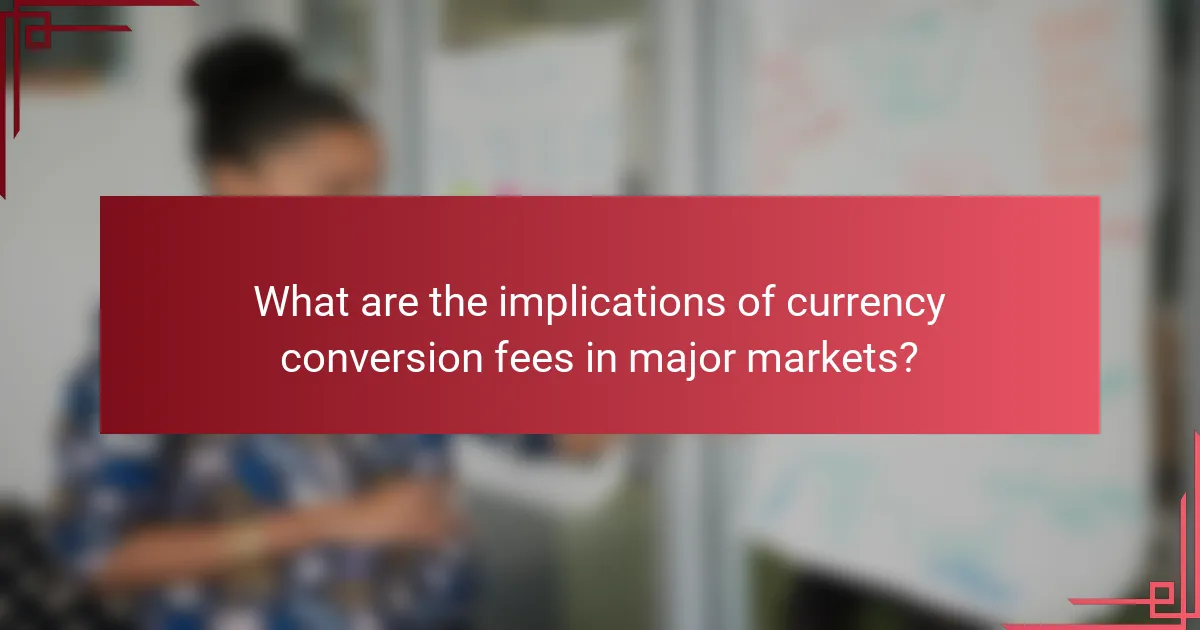
What are the implications of currency conversion fees in major markets?
Currency conversion fees can significantly impact international ticket buyers by adding extra costs to purchases. These fees vary by market and can affect the final price of tickets, making it essential for consumers to understand how they work and what to expect.
Fees in Europe vs. North America
In Europe, currency conversion fees typically range from 1% to 3% of the transaction amount, depending on the payment method and the bank’s policies. North American consumers may encounter similar fees, but they can vary more widely based on the credit card issuer and whether the transaction is processed in the local currency or a foreign one.
For example, using a credit card that charges a foreign transaction fee can lead to additional costs when purchasing tickets in euros or pounds. It’s advisable to check with your bank or card issuer to understand their specific fee structure before making international purchases.
Regional differences in ticket pricing
Ticket prices can differ significantly between regions due to various factors, including currency strength, demand, and local taxes. For instance, a flight from the U.S. to Europe might be cheaper when booked in euros rather than U.S. dollars, depending on the current exchange rate and any applicable conversion fees.
Additionally, some airlines may offer better pricing in their local currency, making it beneficial for travelers to compare prices across different platforms and currencies. Always consider the total cost, including any conversion fees, to determine the best deal.

What emerging trends are influencing currency conversion fees?
Emerging trends such as advancements in technology and shifting consumer preferences are significantly impacting currency conversion fees. These changes are reshaping how international ticket buyers approach transactions, often leading to lower costs and improved transparency.
Blockchain technology in currency exchange
Blockchain technology is revolutionizing currency exchange by providing a decentralized platform for transactions. This technology allows for peer-to-peer exchanges without the need for traditional banks, which can reduce conversion fees significantly.
By utilizing smart contracts, blockchain can automate the currency conversion process, minimizing human error and speeding up transactions. For instance, using cryptocurrencies like Bitcoin or Ethereum can eliminate some of the fees associated with conventional currency exchanges, making it a viable option for international ticket purchases.
However, potential buyers should be aware of the volatility of cryptocurrencies, which can affect the final amount they pay. It’s essential to monitor exchange rates closely and consider transaction times when opting for blockchain-based solutions.
